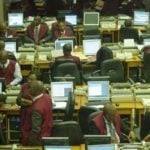Nigeria has overtaken India as the poverty capital of the world, which means Nigeria is the poorest country globally, according to the World Poverty Clock, as compiled by Brooking Institute. About 86.9 million people in Nigeria are living in extreme poverty as at June 2018 and this has worsened by the current population explosion.
Poverty is an economic challenge, characterised by low consumption patterns, social exclusion, material deficiencies in food, clothing, shelter and lack of opportunity for development. The poor are the socially marginalised individuals who have no strong social connections, low income, low purchasing power and low life expectancy as well as declined living standards.
Poverty is measured by income and the poverty line is 1.90$ per day whereas, poverty line in the upper/medium countries is $5.50 per day. More than half the population in Sub-Saharan Africa lives in poverty compared to their counterpart in the USA, Great Britain and Germany.
2023: Why Igbo man must be president —Nwodo
Nigeria is under-delivering prosperity to her citizens, the consequence of which is conflict, since poverty is the root of discontentment in the society. Vulnerability to natural disasters such as climate change, pests’ invasion, droughts, and armed conflicts, contribute to increased poverty, because they lead to loss of livelihoods, farmlands, properties, dignity and well-being. On the other hand, favourable environmental conditions in form of geography (soil fertility and good rainfall) allow productive agriculture which enhances economic development.
Availability of basic infrastructure has real impact on citizen’s quality of life. Lack of water and degradable environment signify poverty conditions. Poverty does not connote lack of money but the lack of ability by an individual to attain the minimum standard of living that is, the basic elements of well-being.
To take people out of poverty, there is need to promote economic growth; the slow rate of economic growth is contributing to poverty increase in sub-saharan Africa. Efforts should be concentrated on raising the productive capacity of the poor in monetary, basic infrastructure and consumption dimensions. These three reinforce one another and we need to know that unequal sharing of jobs, food, and (environmental) resources among households and citizens contribute to poverty. Efforts geared towards reducing inequality will promote economic growth.
Narrowing inequality and increasing shared prosperity, accelerates decline in poverty. To close the gap of inequality in our society, we need to focus on increasing job opportunities and earnings, re-integrating individuals who have been excluded from economic opportunities and earnings, narrow gaps across workers because of gender, types of residences, or sector of employment.
When there is growth in income, prosperity is shared. Access to initiative and ideas will promote economic growth through technological breakthrough, which will make more entrepreneurs to spring forth with new ideas. Investors need to have access to capital to start business, while there should be intense competition among banks and financial institutions to give loans at low interest rates.
In addition, we need to give the less privileged opportunities to access education, involve in small and medium scale enterprises, be accessible to skills and assets, decent jobs that will secure them income and empowerment, food security, and ability to participate in democracy and decision making.
Fashona Esther Folake Ph.D,
Ibadan.
WATCH TOP VIDEOS FROM NIGERIAN TRIBUNE TV
- Let’s Talk About SELF-AWARENESS
- Is Your Confidence Mistaken for Pride? Let’s talk about it
- Is Etiquette About Perfection…Or Just Not Being Rude?
- Top Psychologist Reveal 3 Signs You’re Struggling With Imposter Syndrome
- Do You Pick Up Work-Related Calls at Midnight or Never? Let’s Talk About Boundaries






